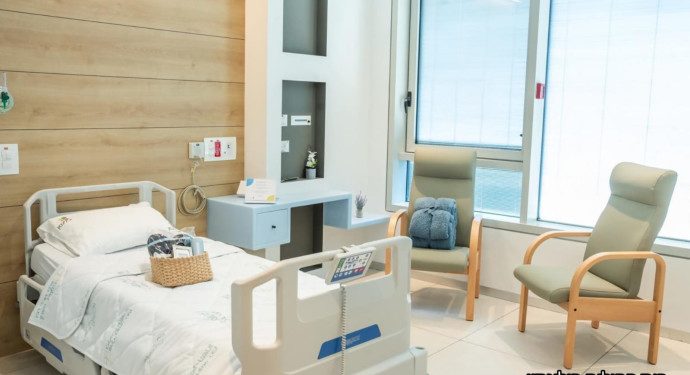The four female IDF observers expected to be released during the second week of the first phase of the hostage deal are expected to arrive at Rabin Medical Center-Beilinson hospital via a CH-53 “Yasur” helicopter on Saturday – after their families greeted her at one of the border crossings.
Upon arrival, and after reuniting with their families, the hostages will also be accompanied by female IDF medical personnel – a deliberate choice. The IDF and Beilinson Hospital emphasized that most of the staff surrounding the women being released during their care will be women.
This decision was made based on information from previous debriefings with released hostages who reported that an environment with mostly women facilitated their initial recovery after enduring captivity by Hamas terrorists.
The freed women will be offered a cup of tea with a teaspoon of sugar, three biscuits and applesauce at the crossing. The modest snack was decided as a preventive measure against potentially fatal refeeding syndrome – which could otherwise be triggered by initially raising blood sugar levels.
The hostages will be offered a shower and another change of comfortable new clothes before boarding another Yasur helicopter with their families for a 40-kilometer flight to Beilinson Hospital.
The heliport is located on a street parallel to Schneider Children’s Hospital near Beilinson, where a new rehabilitation wing has been constructed. The new wing includes 21 spacious rooms with a warm and calming environment.
From the resort’s spacious lobby, families will be able to watch the helicopter land that brings their loved ones just steps from the hospital.
Rooms are equipped with soft clothes, plush bedding, blankets, slippers, mini-fridges, potted plants, reclaimed teddy bears and mobile phone chargers.
Private dining tables will allow released hostages to share meals with family members. Additional services such as beauty treatments, manicures, pedicures and complementary medicine will also be offered.
Next to each hostage’s living quarters will be a room in which their family can stay, allowing the freed hostages a sense of closeness and support.
The hostages will receive a personalized menu according to their nutritional needs. The food, prepared by chefs and nutritionists, offers tasty foods with health values that will restore the body’s strength.
Each hostage will be accompanied by a dedicated medical team – a doctor, a nurse, a social worker and a mental health worker from the Geha Mental Health Center, who will provide a comprehensive therapeutic package. The team will support them through the process, along with treatments such as physiotherapy, occupational therapy and dentistry.
Hostages from the first round to be released
As Israel plans the return of four more hostages on Saturday, the hostages released last week, Emily Damari, Doron Steinbracher and Romi Gonen, are expected to be discharged home.
Hostages released in the first agreement will continue to receive close medical and emotional support while being surrounded by their families and multi-professional teams.
The three women landed at Sheba Medical Center last Sunday and were hospitalized at Tel Hashomer Children’s Hospital, where a hostage service was established.
Each was given a private room with an extra bed for an accompanying person and another room for the accompanying family. Maximum privacy was ensured at the hospital, and outsiders and media personnel were not allowed to enter the inpatient wing.
During the first hours, the three underwent intensive medical examinations and, after clarifying that their state of health was relatively stable and normal, the process of emotional treatment that would accompany them in the months and years to come, slowly and gradually , with maximum sensitivity to their wishes and needs.
Emily Damari had two of her fingers amputated and was undergoing tests and evaluations by the team at the hand surgery department at Sheba, which is considered a leader in the field in Israel.
Psychological treatment includes one-on-one conversations with psychologists and psychiatrists, in addition to occasional use of advanced techniques such as cognitive behavioral therapy (CBT) or EMDR to treat trauma.
Other therapies available to them include art and movement therapy.


